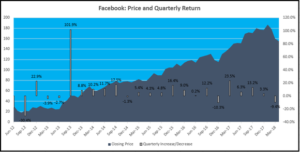To say Facebook (NASDAQ: FB) had an uncharacteristically poor quarter would be an understatement. The bombshell report that Cambridge Analytica had access to the personal data of at least 50 million Facebook users, most of whom did not agree to it, has dragged the high-flying stock down to earth.
Recent company actions appear reassuring. After a week of seeming to avoid facing the controversy and fallout in a meaningful way, CEO Mark Zuckerberg finally took strong ownership by reassuring investors, the media, and users via a conference call with reporters. After committing to stronger privacy controls and data security, Zuckerberg noted that the scandal and subsequent #DeleteFacebook campaign haven’t had a “meaningful impact” on user behavior or ad revenue.
What should long-term investors do? If past is prologue, take a deep breath and do the hardest thing in investing: nothing. Facebook has had negative quarters before and rebounded to reward long-term investors.
All things considered, this wasn’t a horrible quarter for Facebook
Facebook had a poor first quarter, with its stock losing 9.4% of its value from the quarter ended in March. But even considering the damaging headlines, this was not Facebook’s worst quarter. In fact, it wasn’t even Facebook’s worst quarter in two years; that designation goes to the quarter ended December 2016, when investors saw a loss of 10%. Below is a chart with Facebook’s stock price and quarterly returns for the entirety of its publicly traded history.

Chart by author. Return data from Yahoo Finance. Quarterly return denotes percentage return from closing price of last day of prior quarter to last day’s closing price of quarter denoted on chart.
Looking over Facebook’s recent history, you can understand why many investors may be nervous — they’ve mostly been spoiled. Last quarter was only the third quarterly loss the stock had endured in four years. Historical perspective is needed, specifically for the performance before that incredible four-year run.
A brief Facebook history lesson
In 2012 Facebook stock was considered dead money at best. The stock had turned off investors with a botched IPO (not the company’s fault), and analysts’ concerns were mounting about the company’s desktop-first experience in an increasingly mobile world and Zuckerberg’s spendthrift ways: The CEO agreed to pay $1 billion for a little-known photo-sharing app named Instagram at a time when the service had no revenue.
The bearishness reached a crescendo in the quarter ended September 2012 with a quarterly loss of 30%, and that was followed by negative returns in two of the three following quarters.
And how did that work out? Really well for long-term investors: By the following September, shares had rewarded them with returns in excess of 100%. Instagram is now considered a steal as it provides significant revenue and user growth; Facebook makes most of its ad money through mobile; and concerns about the company’s botched IPO are a footnote in the stock’s history.
Focus on the long-term opportunity
Like all companies, Facebook is going to have a few ugly quarters. But as the chart shows, long-term investors who did not overreact and sell during these periods have been handsomely rewarded. Although Zuckerberg has been faulted for his sluggish response to this issue (and rightfully so), I expect the company to provide a more-secure experience with better data protection … and quickly.
In the long run, I expect Facebook stock to recover once this issue is addressed because the company’s leadership position in digital advertising (along with that of Alphabet) is nearly impervious to existing competitors. As more brands shift from television to digital ad spend, the company is uniquely suited to benefit. Facebook investors should ignore the short-term chatter and focus on the long-run opportunity.


